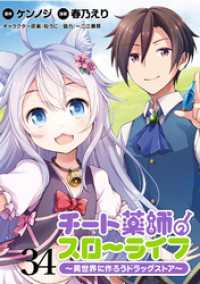- ホーム
- > 洋書
- > ドイツ書
- > Humanities, Arts & Music
- > Music
Full Description
This book delves into a critical and comprehensive analysis of Mtukudzi's legacy, as an outstanding musician who anchored his music on cultural identity specifically through the artistic manipulation of language. As a cultural worker, his remit extended beyond performance. This raised his stature to the levels of such African music icons as Fela Kuti of Nigeria, Salif Keita of Mali and Miriam Makeba/Hugh Masekela of South Africa, all towering giants in African musical performance. This volume examines how Mtukudzi artistically manipulated language to convey a timeless message of cultural identity, fighting for the respect of rights for women, children and all. It unpacks how Mtukudzi subtly uses language to put across political views that speak truth to power, harnessing Zimbabwean language to articulate and promote the nation's cultural heritage and to advocate for societal development and the promotion of rights of vulnerable groups.
The chapters in this volume are a mix ofinterdisciplinary Zimbabwean scholars of linguistics, performance studies, religion, history, communication and media studies, unravelling Mtukudzi as a fighter for human rights and justice who subtly critiqued political systems and practices. It concludes that Mtukudzi strove to be a cultural worker who used the power of language through music to contribute towards the rehabilitation of a battered African identity.
Contents
Chapter 1: Culture, Language, Human Rights and Politics in Oliver Mtukudzi's Music.- Part I: "Fearfully and Wonderfully Made": Mtukudzi and African Cultural Pride.- Chapter 2: "Dada Nerudzi Rwako": Championing African Identities in Oliver Mtukudzi's Music.- Chapter 3: Tuku Music as a Site of Cultural Embodiment.- Chapter 4: Exploring the Nhaka Concept in Oliver Mtukudzi's Music.- Part II: "Language as Identity": Mtukudzi and the Language Question in Africa.- Chapter 5: A Stylistic Analysis of 'Neria,' a Song by Oliver Mtukudzi.- Chapter 6: A Semantic Analysis of Metaphors Found in Selected Lyrics of Oliver Mtukudzi's Songs.- Chapter 7: An Exploration of Metaphoric Images in Oliver Mtukudzi's Songs on HIV/AIDS.- Chapter 8: A Stylistic Study of Figurative Language in Oliver Mtukudzi's Selected Songs.- Chapter 9: The 'I' in Oliver Mtukudzi's Music: Autobiographical Memory and the Fragmented Self in Selected Songs.- Chapter 10: "Pakare Paye": Music as Media for Communicating Values in the Family Governance System—The Case of Oliver Mtukudzi's Songs.- Part III: Mtukudzi as a Human Rights Defender and "Theologian".- Chapter 11: Championing Marital Harmony Through Music: An Examination of Four Selected Songs by Oliver Mtukudzi.- Chapter 12: Music and Human Rights in Zimbabwe: An Analysis of Oliver Mtukudzi's Messages.- Chapter 13: Oliver Mtukudzi's Theology: A Literary Analysis of Selected Gospel Songs.- Part IV: "Walking the Tightrope": Playing Politics with Politics in a Challenging Environment.- Chapter 14: The Corpse as Political Capital: Oliver Mtukudzi's Funeral and Political Contestation in Post-colonial Zimbabwe.- Chapter 15: Music and Politics in Mashava: An Analysis of Selected Songs by the Late Oliver Mtukudzi.- Chapter 16: Stance Accounts of Political and Religious Identities in 'Tuku' MusicTuku' Music.








